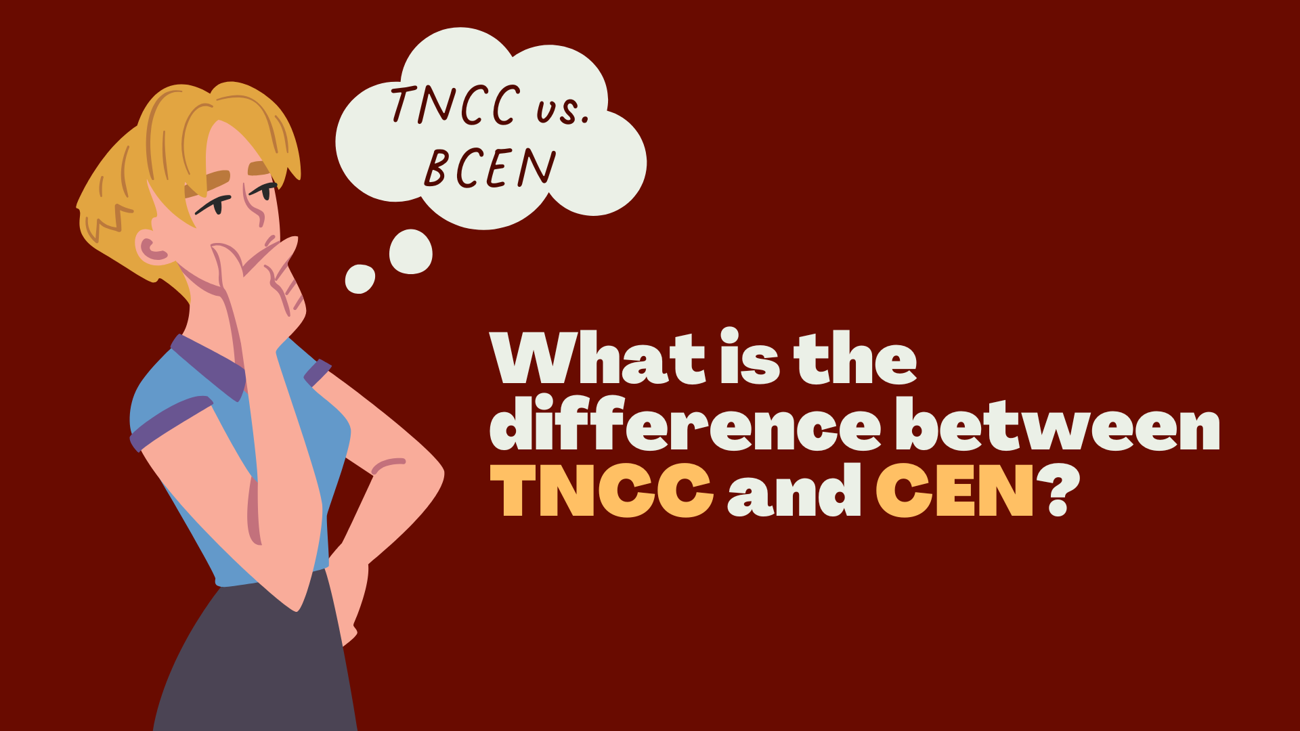TNCC vs. CEN?

In the world of nursing, certifications open doors to new opportunities and highlight a nurse's commitment to specific areas of care. Two popular certifications that often leave nurses wondering which path to take are the Trauma Nursing Core Course (TNCC) and the Certified Emergency Nurse (CEN). While both are respected in the field, they serve different purposes and cater to different career goals. Let's explore what sets these certifications apart and how each can shape a nurse's career in the healthcare sector.
Understanding TNCC: Focus on Trauma
The Trauma Nursing Core Course (TNCC) certification is a critical credential for nurses specializing in trauma care. It equips them with the expertise needed to manage patients affected by accidents, violence, or natural disasters. Through TNCC, nurses develop the skills required to assess, manage, and treat traumatic injuries, enabling them to deliver prompt and effective care that can improve patient outcomes and survival rates in critical situations.
Key TNCC Topics:
The TNCC curriculum covers essential areas of trauma care, including:
- Airway and ventilatory management.
- Musculoskeletal injury treatment.
- Shock management.
- Comprehensive trauma patient assessments.
- Effective triage strategies for trauma cases.
This certification is especially valuable for nurses working in high-stakes environments like emergency rooms (ERs), intensive care units (ICUs), and critical care settings.
Certification Process:
To earn TNCC certification, nurses must complete a course through an authorized training center. These courses typically include a combination of lectures, online modules, and hands-on simulations to provide a comprehensive learning experience. At the conclusion of the program, participants must pass both a written exam and a practical skills assessment to demonstrate their knowledge and proficiency.
Relevance for ER Nursing:
TNCC or a similar trauma nurse certification is often a requirement for ER nursing, as these credentials ensure nurses are prepared to handle the fast-paced and unpredictable nature of trauma cases. This specialized training not only enhances patient care but also ensures the nursing team can respond effectively during critical emergencies.
Exploring CEN: Embracing Emergency Care
The Certified Emergency Nurse (CEN) certification is tailored for nurses working in emergency settings. Unlike the Trauma Nursing Core Course (TNCC), which focuses primarily on trauma care, the CEN certification covers a broader spectrum of emergencies. It equips nurses to handle diverse and complex situations, making it a valuable credential for those in the dynamic environment of an emergency department (ED).
Key CEN Topics:
The CEN curriculum spans various critical areas, including:
- Cardiac emergencies.
- Respiratory crises.
- Mental health emergencies.
- Rapid medication administration under pressure.
- Managing a wide range of acute medical and surgical emergencies.
This certification ensures nurses are prepared for the unpredictable and fast-paced nature of emergency nursing.
Certification Process:
To earn CEN certification, nurses must pass an exam administered by the Board of Certification for Emergency Nursing (BCEN). This rigorous test evaluates their knowledge and skills across the emergency care spectrum, ensuring they are capable of managing high-pressure scenarios and delivering exceptional care in emergency settings.
Relevance for ER Nursing:
Similar to TNCC, the CEN certification is highly regarded nationally and internationally. It is often a preferred or required credential for emergency room nurses, demonstrating their expertise in handling diverse and challenging cases. By obtaining the CEN certification, nurses can enhance their career opportunities, improve patient outcomes, and position themselves for professional advancement in emergency nursing.
Key Differences and Choosing Your Path
While TNCC and CEN certifications improve a nurse's skills and career prospects, they differ mainly in focus and scope. TNCC concentrates on trauma nursing and provides specialized training in treating patients with traumatic injuries. This certification is best for those who wish to specialize in trauma care and work where trauma cases are frequent.
CEN, in contrast, spans a wider array of emergency nursing skills. It involves training not only in trauma but also in medical, surgical, and psychiatric emergencies. It’s the right choice for nurses who want a well-rounded approach to emergency nursing, ready to tackle the various challenges they might face in an emergency room setting.
Deciding between the two involves thinking about career goals and the type of environment you want to work in. Are you drawn to the specialized field of trauma nursing, or do you enjoy the excitement and variety offered by general emergency care? Your answer to this question can guide you toward the certification that suits your professional aspirations.
Career Impact and Future Prospects
For those pursuing a career in emergency nursing, obtaining the CEN certification can set nurses apart in a competitive field, making them more attractive candidates for job opportunities, promotions, and leadership roles. While TNCC is a foundational requirement for many ER positions, CEN offers nurses a broader skill set, potentially opening doors to advanced roles and specialization. These certifications help nurses grow professionally, elevating their career prospects while allowing them to provide comprehensive and effective care in diverse emergency situations.
Conclusion
In conclusion, while the TNCC certification is commonly required for emergency room nurses, the CEN certification, although not mandatory, can significantly enhance a nurse’s resume and lead to more career opportunities. TNCC provides specialized trauma care training, essential for managing traumatic injuries in high-stakes environments, while CEN broadens a nurse's expertise to handle a wide variety of emergencies. Both certifications improve a nurse's ability to deliver high-quality care in critical situations, ultimately leading to better patient outcomes and survival rates.
Interested in contributing to our blog or partnering with us? Want to share your story of how Crucial Exams helped you? Contact Us .